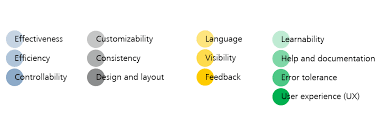Exploring the Impact of Agile Methodologies in Software Development Projects
The Importance of Software Development Projects
Software development projects play a crucial role in today’s digital world. From creating mobile applications to building enterprise software systems, these projects drive innovation and enable businesses to stay competitive in a rapidly evolving market.
Key Phases of Software Development Projects
Software development projects typically go through several key phases:
- Planning: This phase involves defining project goals, scope, and requirements. It sets the foundation for the entire project.
- Design: In this phase, developers create a blueprint of the software solution, including architecture, user interface design, and data structures.
- Development: The actual coding and implementation of the software take place in this phase. Developers bring the design to life through programming.
- Testing: Quality assurance is critical to ensure that the software functions as intended. Testing helps identify and fix bugs and issues before deployment.
- Deployment: Once the software is tested and approved, it is deployed to production environments for end-users to access and utilize.
- Maintenance: Post-deployment, ongoing maintenance and updates are necessary to keep the software running smoothly and address any new requirements or issues that arise.
The Role of Project Management in Software Development
Effective project management is essential for the success of software development projects. Project managers oversee scheduling, resource allocation, risk management, and communication among team members to ensure timely delivery within budget constraints.
The Impact of Agile Methodologies
In recent years, agile methodologies have gained popularity in software development projects due to their iterative approach that emphasizes flexibility and collaboration. Agile allows teams to adapt to changing requirements and deliver incremental improvements throughout the project lifecycle.
In Conclusion
Software development projects are dynamic endeavors that require careful planning, skilled execution, and continuous adaptation. By embracing best practices in project management and leveraging innovative technologies, organizations can successfully deliver high-quality software solutions that meet user needs and drive business growth.
Essential FAQs About Software Development Projects: Phases, Challenges, and Best Practices
- What is a software development project?
- What are the key phases of a software development project?
- How important is project planning in software development projects?
- What role does testing play in software development projects?
- How do agile methodologies impact software development projects?
- What are the common challenges faced in software development projects?
- How can project management tools help streamline software development projects?
- What are the best practices for successful completion of software development projects?
What is a software development project?
A software development project refers to a structured endeavor aimed at creating, designing, and implementing software solutions to address specific needs or requirements. It involves a series of planned activities, such as defining project goals, gathering requirements, coding, testing, and deployment. Software development projects require collaboration among developers, designers, testers, and project managers to ensure the successful delivery of high-quality software products that meet user expectations and business objectives. Effective project management practices play a crucial role in overseeing the project’s progress, resource allocation, risk mitigation, and timely completion within budget constraints.
What are the key phases of a software development project?
In software development projects, the key phases typically include planning, design, development, testing, deployment, and maintenance. During the planning phase, project goals, scope, and requirements are defined to establish a solid foundation. The design phase involves creating a blueprint of the software solution, encompassing architecture and user interface design. Development is where the actual coding and implementation take place. Testing is crucial for quality assurance to identify and rectify any issues before deployment. Once tested and approved, the software is deployed for end-users to access. Maintenance follows post-deployment to ensure ongoing functionality and address any new requirements or challenges that may arise. These phases are essential for a successful software development project from inception to maintenance.
How important is project planning in software development projects?
Project planning is a critical aspect of software development projects as it sets the foundation for success. Proper project planning helps define project goals, scope, timelines, and resource requirements, ensuring that all stakeholders are aligned and aware of the project’s objectives. By creating a detailed project plan, teams can effectively manage risks, allocate resources efficiently, and establish a roadmap for the development process. Effective project planning in software development projects enhances communication, minimizes delays, and increases the likelihood of delivering high-quality software solutions that meet user expectations.
What role does testing play in software development projects?
Testing plays a crucial role in software development projects as it ensures the quality, reliability, and functionality of the software being developed. By systematically evaluating the software against predefined requirements and use cases, testing helps identify defects, bugs, and potential issues early in the development process. This proactive approach not only improves the overall quality of the software but also reduces the likelihood of costly errors in production. Testing also provides valuable feedback to developers, enabling them to make necessary improvements and enhancements before final deployment. In essence, testing is an integral part of software development projects that ultimately contributes to delivering a successful and user-friendly product.
How do agile methodologies impact software development projects?
Agile methodologies have a significant impact on software development projects by promoting a collaborative and iterative approach to project management. Unlike traditional waterfall methods, agile allows for flexibility and adaptability throughout the development process. By breaking down the project into smaller, manageable tasks called sprints, agile teams can deliver incremental improvements and respond quickly to changing requirements. This results in enhanced communication, increased transparency, and higher levels of stakeholder engagement, ultimately leading to more efficient project delivery and higher-quality software products.
What are the common challenges faced in software development projects?
In software development projects, several common challenges are frequently encountered. These challenges may include scope creep, where project requirements expand beyond the initial plan, leading to delays and increased costs. Communication gaps among team members or stakeholders can also hinder progress and result in misunderstandings. Tight deadlines and unrealistic expectations can put pressure on the team, affecting the quality of deliverables. Additionally, changing technology landscapes and evolving user needs may require constant adaptation, making it crucial to stay agile and responsive throughout the project lifecycle. Addressing these challenges proactively with effective planning, communication strategies, and risk management can help mitigate their impact on software development projects.
How can project management tools help streamline software development projects?
Project management tools play a crucial role in streamlining software development projects by providing teams with centralized platforms to plan, track, and collaborate effectively. These tools offer features such as task assignment, progress monitoring, resource allocation, and communication channels that enhance productivity and coordination among team members. By utilizing project management tools, teams can establish clear timelines, identify dependencies, manage risks, and ensure that project milestones are met efficiently. Additionally, these tools facilitate transparency and accountability throughout the project lifecycle, enabling stakeholders to stay informed and make data-driven decisions to optimize project outcomes.
What are the best practices for successful completion of software development projects?
When it comes to ensuring the successful completion of software development projects, following best practices is essential. Key strategies include thorough project planning to define clear goals and requirements, effective communication among team members and stakeholders, regular testing to identify and address issues early on, prioritizing collaboration and flexibility through agile methodologies, and diligent project management to track progress, allocate resources efficiently, and mitigate risks. By adhering to these best practices, software development projects are more likely to achieve their objectives within the specified time frame and budget while delivering high-quality solutions that meet user needs.







